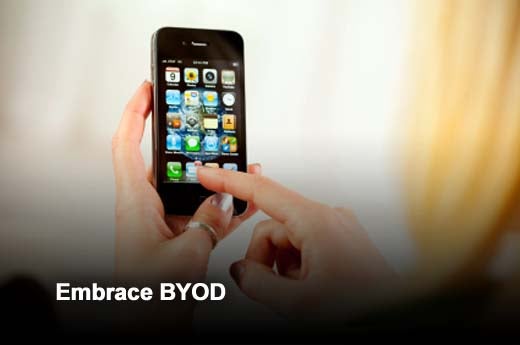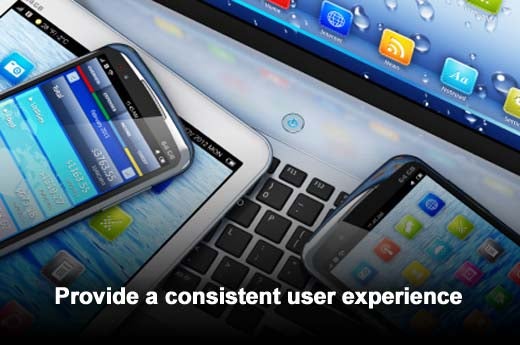A mobile enterprise is one where people can work from anywhere, anytime. There is a host of reasons businesses are finding it hard to “go mobile.” First of all, mobile at work means a lot more than having access to a smartphone or tablet. A true mobile enterprise is one where people are completely productive, anytime, anywhere … in the office and on the go. Secondly, it’s not about mobile devices — it is about business, technology, and people. And that means having a business strategy, a technology strategy, as well as a people/worker strategy to achieve business results. Ignore any one of these key elements at your peril. David Lavenda, vice president of product strategy at harmon.ie, offers 10 tips you need to heed to become a mobile enterprise.
Click through for 10 tips for developing a true mobile enterprise, as identified by David Lavenda, vice president of product strategy at harmon.ie.
Specific goals help focus the project on how it can help the business. Here are examples of business goals:
- Deliver products or complete service engagements faster and with less staff.
- Drive more sales through efficient sharing of important business documents and emails.
- Reach compliance goals for government directives or industry regulations.
Enable people to work together wherever they may be – this will reveal the nascent potential of the mobile enterprise, thereby justifying the investment in the mobile initiative.
Articulate the goals of the initiative so everyone in the company knows what the project is trying to achieve. Putting up posters, creating a website and scheduling PR events are all good ways to get the word out.
Brand the initiative to make it your own. Make people aware that they are part of something important, not just being asked to use the latest IT productivity tool. Also, seeing the company logo on the user interface makes people feel they are supporting the company, not some third-party vendor.
Provide freedom of choice for selecting mobile devices and support all the popular mobile devices, such as iOS, Android and BlackBerry. With the ubiquity of BYOD programs, most workers already have a smartphone or tablet at work. Forcing them to adopt a single platform is a formula for failure.
Provide a consistent user experience on all devices across mobile, desktop and cloud interfaces. Make sure the apps you use provide an appropriate level of information and service for each platform and interface. For example, desktops have more real estate for editing text. Smartphones? … Not so much.
Provide the appropriate levels of security for each device and use case. Some options include creating dataless mobile devices, VPN access, building secure platforms or using an MDM/MAM solution. Overdoing security concerns complicates the user experience and lowers the chance of success. Not all devices and use cases require the same level of security. Remember that ease-of-use trumps security every time when becoming the solution that workers will use.
Leverage existing products and work habits. The less you change, the better your chance for success. Email, SharePoint and IM are three products every worker already uses. Don’t try to replace them; embrace them as part of the overall solution.
Train workers appropriately by investing in your team. They will determine the success of the initiative. Also, start slowly by creating and publicizing easy wins. Make it easy for people to gain confidence with working on mobile devices. Then build on the successes and extract additional business value. For example, start by letting people collaborate on shared documents, thereby eliminating the document chaos created by email document attachments.
Identify “connector people” in IT who can bring IT and business users together to talk about common interests. Use “lunch and learn” meetings or webinars to let IT folks explain how mobile technology can help achieve business goals. Or try opening the floor for Q&A to allow people to ask questions in a relaxed environment.













